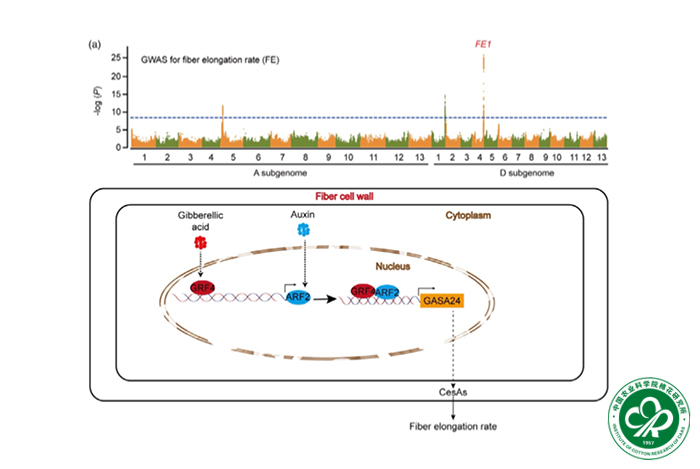- Location : Home» Newsroom
GhGRF4/GhARF2-GhGASA24 module regulates fiber cell wall thickness by modulating cellulose biosynthesis in upland cotton (Gossypium hirsutum)
Recently, the research entitled “GhGRF4/GhARF2-GhGASA24 module regulates fiber cell wall thickness by modulating cellulose biosynthesis in upland cotton (Gossypium hirsutum)” has been published by The Plant Journal (IF = 7.1). The researchers identified a major gene that controls the elongation of upland cotton fibers, and analyzed the relevant regulatory mechanisms, which provides theoretical support for improving the quality of cotton fibers, especially textile-related indicators.
Cotton fiber ( Gossypium hirsutum ) serves as an ideal model for investigating the molecular mechanisms of plant cell elongation at the single-cell level. Brassinosteroids (BRs) play a crucial role in regulating plant growth and development. However, the mechanism by which BR influences cotton fiber elongation remains incompletely understood. In this study, we identified EXORDIUM-like ( GhEXL3 ) through transcriptome analysis of fibers from BR-deficient cotton mutant pagoda 1 ( pag1 ) and BRI1-EMS-SUPPRESSOR 1 ( GhBES1.4 , encoding a central transcription factor of BR signaling) overexpression cotton lines. Knockout of GhEXL3 using CRISPR/Cas9 was found to impede cotton fiber elongation, while its overexpression promoted fiber elongation, suggesting a positive regulatory function for GhEXL3 in fiber elongation. Furthermore, in vitro ovule culture experiments revealed that the overexpression of GhEXL3 partially counteracted the inhibitory effects of brassinazole (BRZ) on cotton fiber elongation, providing additional evidence of GhEXL3 involvement in BR signaling pathways. Moreover, our findings demonstrate that GhBES1.4 directly binds to the E-box (CACGTG) motif in the GhEXL3 promoter region and enhances its transcription. RNA-seq analysis revealed that overexpression of GhEXL3 upregulated the expression of EXPs , XTHs , and other genes associated with fiber cell elongation. Overall, our study contributes to understanding the mechanism by which BR regulates the elongation of cotton fibers through the direct modulation of GhEXL3 expression by GhBES1.4.
This study was supported by the National Natural Science Foundation of China (Grants 32360509, 32301888, and 32350410409), Tianshan Talent Training Program (Grant 2022TSYCCX0087), Key Research and Development Program of Xinjiang (Grant 2022B02052), and the Natural Science Foundation of Henan Province (Grant 232300421253).
http://doi.org/10.1111/tpj.17083
